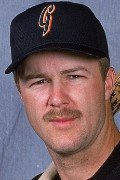Once again, not sure what the voters are looking for. I think Kent checks all the boxes and yet he is on his next to last year on the ballot.
They made Ortiz's case on the same day. Why not, keeping Bonds out is good enough for most of the electors because they care more about how players treated the media than almost anything else.
HOF Candidate Spotlight
 | WAR: 55.5 Better than 36.4% of HOFers Black Ink: 0 Better than 0.0% of HOFers Gray Ink: 71 Better than 11.7% of HOFers HOF Monitor: 122.5 Better than 40.5% of HOFers JAWS: 45.62 Better than 35.0% of HOFers at 2B |
Jeff Kent enters his 9th year on the ballot. After hovering in the teens for most of his eligibility, he has made a jump in the last two cycles and peaked at 32.4% of the vote last year. Kent was an average starter for most of the 1990s, not finding his peak performance until joining the San Francisco Giants in 1997. During his 6-year Giants tenure he finished in the top 10 of MVP voting 4 times, including winning the NL MVP in 2000 over his teammate Barry Bonds.
Kent provided a lot of offensive value from a traditionally weaker position of second base. Kent hit 351 of his home runs as a second baseman, the record holder by a decent amount. Kent was not a top defender at the position, only surpassing 1.0 defensive WAR in his 1997 season. That being said, his total value was the best among 2nd basemen for a time. From 1997-2005, Kent recorded 42 WAR, with the next closest 2nd baseman being Craig Biggio with 32 WAR in that time span.


